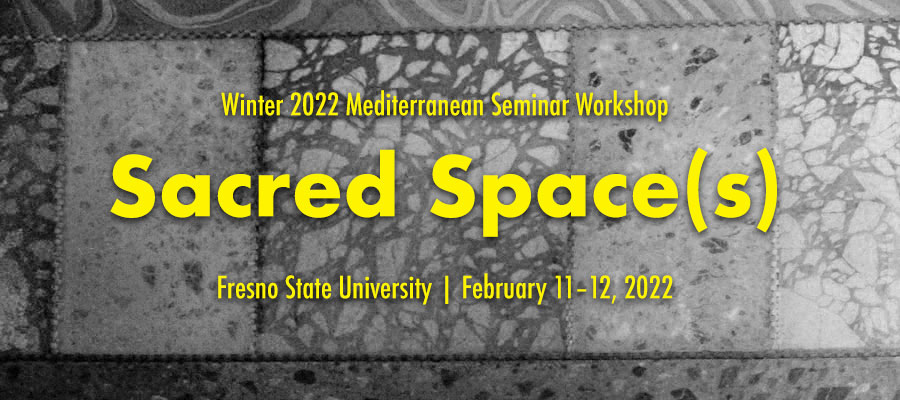Sacred Space(s), Winter 2022 Mediterranean Seminar Workshop, Fresno State University, February 11–12, 2022
The Mediterranean Seminar is delighted to announce its first in-person workshop since the onset of COVID.
Paper proposals and round-table participants are being sought for the Mediterranean Seminar’s two-day Winter 2022 Meeting, to be held at Fresno State University on 11 & 12 February on the subject “Sacred Space(s).”
In Antiquity, the Mediterranean was home to a an array of agnate pagan, mythic, and magical religious traditions while in late Antiquity and the early Middle Ages, it came to be dominated by the “Abrahamic faiths.” Judaism, Christianity, and Islam all developed in the Mediterranean region. They shared a common scriptural and theological tradition yet in many contexts saw each other as illegitimate competitors. Whether real or imaginary, sacred space played a critical role in the self-definition and ideological toolkit of the religious traditions of the premodern Mediterranean. In the intense environment of Mediterranean cultural interaction, religious leaders, political elites, and believers of differing confessions and praxes continually negotiated, appropriated, and shared sacred spaces. Sacred spaces were used to more sharply delineate communities or to blur lines between them. Religious and political elites supported or destroyed sacred spaces to enhance their own status and legitimacy. Texts, images, and buildings also signaled to their readers what type of space they were about to enter or were forbidden from entering. This workshop will explore how sacred spaces helped shape, and were shaped by, inter-communal dynamics in the Mediterranean from prehistory to the modern era.
For the workshop (to be held on Friday, 11 February), we invite abstracts of in-progress drafts of articles or book/dissertation chapters on any subject (historical, cultural, literary, artistic, or historiographical) relating to sacred spaces in the premodern or modern Mediterranean, broadly construed. Particularly welcome are papers (a) relating to the conception or construction of sacred space and the recognition or adaptation of sacred spaces across different religious traditions, and the multi-religious/ethnic environment of the region, including cross-confessional influence, relations, syncretism, and literary and/or artistic representations; or (b) papers that address the longue durée, methodology, or that are comparative in approach. Papers from history, art history, literary and cultural studies, or any relevant Humanities or Social Sciences discipline are welcome. Our Mediterranean is construed geographically as including southern Europe, the Near East and North Africa and into the Black Sea and Central Asia, and the Red Sea and the western Indian Ocean; however, scholars who work on analogous themes in other periods and regions are encouraged to apply.
All North American-based scholars (or foreign scholars who will be in the US at this time) working on relevant material are encouraged to apply. Scholars from further abroad may apply but we cannot pay full travel costs. ABD PhD students, junior and non-tenure track faculty are particularly welcome to apply.
On the second day, Saturday 11 February, a one-day symposium on “The cultural dynamics of shared and contested sacred spaces in the premodern Mediterranean” will feature three round-table conversations, focusing on the following questions:
- Did shared sacred spaces directly impact strategies of co-existence among religious communities? To what extent are they manifestations of a common Mediterranean culture?
- How was a sacred space recognized? Was there a common vocabulary of words or images used to define sacred spaces and communicate their valence?
- How and at what moment were sacred spaces converted or transformed?
Participants will be expected to attend the entire two-day symposium.
A separate call for non-presenting workshop and symposium attendees will go out in November.
This workshop is sponsored and supported by the Armenian Studies Program. the College of Arts and Humanities, the Classical Studies Program, and the Jewish Studies Program at Fresno State, and the CU Mediterranean Studies Group.
